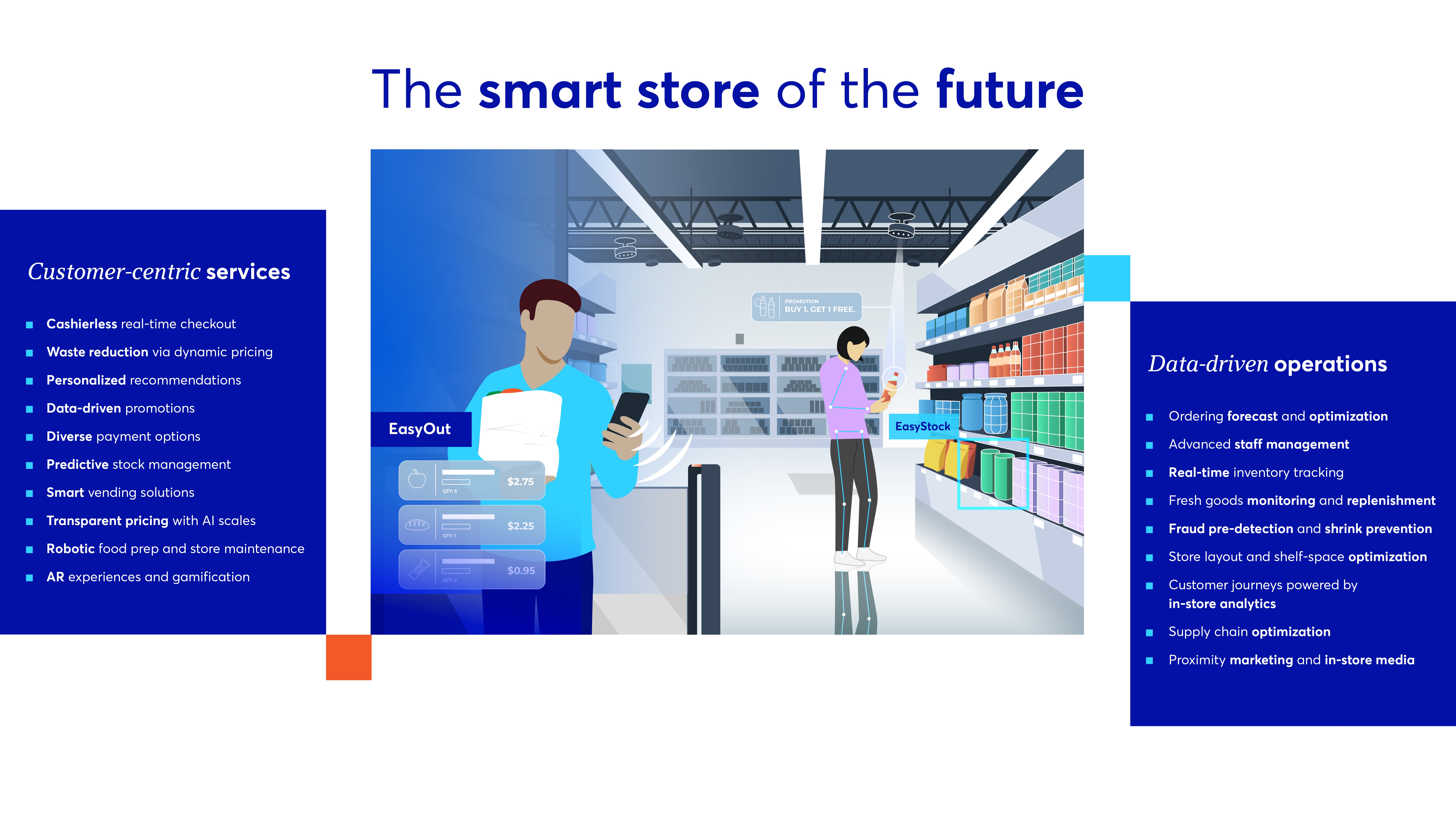Data-Driven Retail: A Vision of the Future Store
When thinking about what the grocery store of the future might look like, the image forming in our heads may be a jumble of electronic shelf labels, smart carts, and isle-roaming robots. The grocery retail industry is buzzing with the activity of countless disruptors in a race to solve its key pain points, from long checkout lines and items missing from shelves to labor shortages and supply chain challenges.
The meteoric rise of eCommerce in recent years caused a shift in the role of the physical store. No longer the default for everyday shopping, brick-and-mortar stores are differentiating themselves as places for shoppers to have delightful experiences, receive meaningful assistance and guidance from store associates, and get their goods instantly. More and more, stores are emphasizing convenience and speed to meet expectations shaped, to a large degree, by digital reality.
Innovation is anticipation. For retailers, it means knowing what shoppers need and want before they themselves realize it. Retailers must attempt to predict what the retail of the future might be like to correctly identify, and invest in, the transformative technology that will place them ahead of the competition.
Which tech will prevail, and which will fail?
In an ecosystem flooded with new technologies, how can retailers assess which tech will transform retail and which will prove superfluous? In other words, how can innovators decide where to invest?
For tech-savvy retailers, it’s about simplicity. According to Aldi Nord CTO Sinanudin Omerhodzic, technology is just the vehicle to make customers happier.
Working for a market-leading discounter, Mr. Omerhodzic and his team face the challenge of optimizing for innovation while keeping an eye on cost. Speaking at EuroShop 2023, he said: “We have a responsibility that the tech would simplify the lives of our customers on one hand, but on the other hand, should not have a negative impact on our cost, and should not have an impact on our product prices. Our business model is to have price leadership.”
Mr. Omerhodzic and his team are leveraging technology to improve store operations, optimize product availability, cut costs, and support sustainability. Aldi Nord was one of the first retailers to transform their stores into smart stores by adopting automation and frictionless checkout technologies. The discount leader opened their first Trigo-powered fully autonomous store in Utrecht, Netherlands in 2022.
Experts say that broadly, innovation is advancing in three main channels: automation, data-powered decisions, and advanced experiences. In a reality shaped by the rise of AI applications, automation and data-driven decisions and operations go hand in hand. And, as data analytics and artificial intelligence become more sophisticated, grocery stores will be able to offer more personalized shopping experiences, such as customized product recommendations and personalized promotions and discounts.
While automation and data-driven retail are focused on seamlessly removing friction from the physical retail journey, the growing focus on experience-driven retail is taking the store of the future in unexpected directions. Mert Damlapinar, director of e-commerce strategic insights and tech products at L’Oréal, recently told MIT Sloan about his transformative vision for the store of the future. According to him, high-definition interactive displays will replace physical products, like stepping into a catalog in the metaverse, and only a fraction of the store will consist of shopping aisles. The rest will be dedicated to fulfillment centers supporting in-store and online purchases. This last part is not so futuristic. Whole Foods and Amazon Fresh already use some stores as micro fulfillment centers, as does BestBuy.
The majority of the store, according to Mr. Damlapinar, will be devoted to experiences, including recreational activities, all designed to increase the engagement and the lifetime value of the consumer, and enhance brand loyalty.
A recent IGD report has recognized five key technologies that will shape retail in 2023 and beyond. These are:
- Automation: cashier-less and hybrid checkout concepts, smart vending solutions, AI scales, and robot-powered store operations such as shelf management.
- AI-driven insights: leveraging data to improve pricing, cut costs, optimize store operations, and offer better experiences and personalization.
- Cyber security: as data-driven retail prevails, retailers will invest in new solutions around data security and usage.
- Web 3.0: the metaverse in service of experiential grocery shopping, from visual search to seamless payments and personalization.
- Investment in digital infrastructure: cloud computing, green data centers, and connectivity to power everything from smart pricing to store cleaning robots that double as a fleet of operations monitors.
The impact of data-driven retail operations
“Since I joined Aldi Nord very often people ask me which tech is going to change the retailers,” Mr. Omerhodzic said recently. “To be honest, I don’t think tech will change retailers. It’s all about the Data. we are trying to identify along the value chain from A to Z how to automate our processes, and how to make them more efficient, through the data decision triggers. So we’re trying to record how our products are flowing from A to B in order to find out how to optimize, and automate, through specific technologies.”
In a recent Google Cloud report titled “Transforming food, drug, and mass merchant retail with AI,” the authors posit that after a decade highlighting mobile innovation in retail and a focus on omnichannel experience, the 2020s will be the decade of AI-powered experiences and processes. Across the entire retail value chain, the researchers identified 75 use cases where AI/ML can create or enhance value for retailers. In all instances, it offers value by “solving old problems in new ways.”
Google Cloud’s vision of the future store includes top-of-funnel activities such as personalized promotions and recommendations, AI-powered loyalty programs, smarter picker routing, smart pricing, and inventory/assortment optimization, and all the way to the data-driven and AI-powered logistics in the background.
Of these, frictionless checkout was singled out as unlocking the highest value for retailers, with an estimated value of up to $98 billion in 2023*. By leveraging computer vision and data analytics to offer cashier-less checkout, retailers reduce or redirect store labor, deliver superior shopping experiences, and enhance and streamline store monitoring to increase efficiency. By capturing both the action of the consumer and the products they are collecting in the store, retailers earn rich data. While frictionless checkout is technically complex, it also holds high-value potential.

Data-driven use case: stock predictions
Together with long checkout lines, missing items are often quoted as the biggest pain when it comes to grocery shopping. Many retailers are investing their innovation dollars in technologies designed to streamline and optimize stock management to cut costs and make missing products a thing of the past. By laying the technological infrastructure to deliver rich and comprehensive store data, retailers can advance to data-driven predictive stock management.
Computer vision technologies like the ones powering cashier-free checkout create a digital twin of your store that lets you see the full picture of your in-store inventory and capture real-time on-shelf availability. Plan your sales floor inventory requirements based on accurate in-store order projections and shopper preferences. Improve inventory turnover while reducing waste and cutting operating costs. Transform real-time shelf intelligence into actionable insights to continuously modernize processes and operations.
“This is a huge lever in terms of optimization,” according to Mr. Omerhodzic. “To direct the entire supply chain in the most efficient way, to understand how many of our customers will walk into the store tomorrow and which products they would like – even the different sorts, yogurt with lemon or yogurt with strawberry – if you have exactly the capabilities to know that and to drive your entire supply chain around that, then you increase your efficiency by a much higher level than ever before.”











